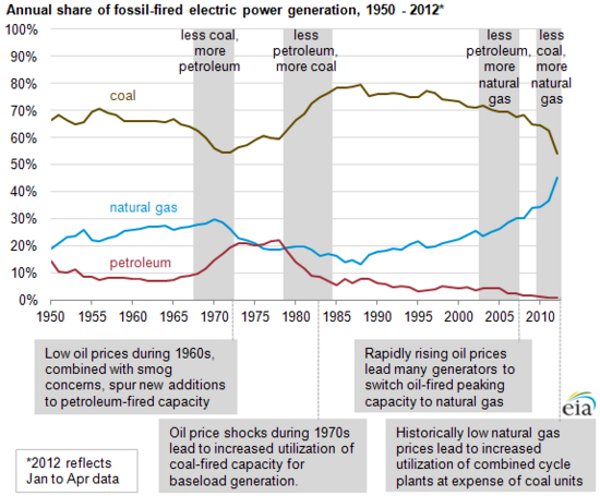U.S. Emissions Drop Due to Switch to Shale Gas from Coal


U.S. emissions have dropped 7.7% since 2006 due to the rapid switch from coal to shale gas. All this cheap gas came from a concerted, public-private effort dating back to the mid-1970s to cheaply extract gas from shale. There is a clear lesson for those concerned about global warming: seek public-private investments in technological innovation to make clean energy cheap.
Breakthrough Institute has since 2007 made the case that a public-private technological push on clean energy sources was the key to reducing emissions, and that carbon pricing is less important. The shale gas revolution shows that a rapid and significant decline in emissions can occur without cap and trade or a carbon price. Europe has had both, but neither have resulted in any measurable emissions reductions.
To deal with global warming, we will need an entirely new energy infrastructure. Creating a new energy infrastructure is more comparable to the creation of the railroads, the interstate highway system, personal computers, the Internet, and the space program than it is to installing catalytic converters and scrubbers, or phasing out ozone-depleting chemicals. The latter involved mere technical fixes, not wholesale technological revolutions.
Environmentalists have been so focused on making clean energy relatively cheaper (by imposing regulations that make dirty energy expensive) that they overlook the possibility of making clean energy absolutely cheaper through major investments in technology innovation and infrastructure.
Causes of the shale gas revolution.
The history behind the shale gas boom remained virtually unknown until late 2011, when researchers at the Breakthrough Institute conducted an extensive investigation revealing the role that federal agencies like the Department of Energy and the National Laboratories played in supporting gas industry experimentation with shale fracking.Featured in the Washington Post and the President's 2012 State of the Union, this Breakthrough investigation enunciates - again - the crucial role that the federal government has always played in technological innovation...
Government-led efforts to make shale gas and renewables cheap challenge the orthodoxies of neo-classical economists
The Economist's Ryan Avent says "economics is clearly moving beyond the carbon-tax-alone position on climate change, which is a good thing." In fact, Acemoglu and his colleagues went further than Avent suggested. "Optimal policy," they found, "relies less on a carbon tax, and even more so on a direct encouragement of clean energy technologies."
Which nations have reduced their emissions most rapidly? Sweden and France. They did so not through a carbon price or cap and trade but rather technological innovation.
(This was excerpted from The Breakthrough Institute, where it first appeared.)



